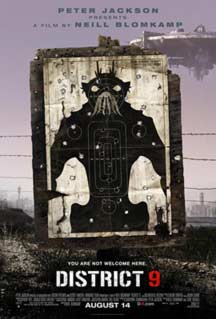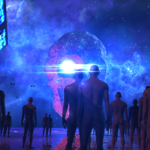
District 9 conveys a much needed ethical message
Science fiction has always been a bastion for social commentary, and the latest cinematographic effort in the form of District 9 is no different. By planting the action in an accurate real-world setting, with believable motivations and agendas from all parties involved, the mirror is once more held up to our social conscience – and the result is anything but flattering.
I’m not here to review the movie like so many other sites have already done, heaping well-deserved praise onto a film that just has to be seen to truly comprehend the visceral experience it has to offer. What I wanted to look at were the very real themes of future ethics that are at play here, for this movie is primarily about social choices and the results of an ethics based on economic profit.
For those of you who haven’t seen it yet, I won’t go into too much detail about the plot – but do please be aware that some of what I will be discussing might remove some of the unknown from the film which makes it so refreshing. This is a film that goes against what you were expecting, one that plays on your presumptions in order to bring up far deeper and more disturbing issues. This isn’t your average summer blockbuster.
The first, and most obvious, subtext within the film is one of racism – or in this case speciesism. Setting the film in South Africa instantly creates a correlation with apartheid, and one which does bring up some interesting thoughts about the human capacity to distrust and despise others.
The familiar story of wide-spread humanitarian (or, this case, non-humanitarian) aid initiatives to help quickly turns into fear and suspicion once the original crisis has been averted and the non-humans must integrate somehow into the life and identity of the city. The inflexible nature of many of our cultural norms quickly comes into conflict with the different values and behaviour held by the non-humans, with a lot of hostility and distrust emerging as a result. The allegory is clear, and used effectively, but in the end I do feel like there are deeper issues at hand.
It is not just the underlying shadow of racism that truly lies at the core of the ethical questions raised by the film (indeed, in an audio interview with director Neil Blomkamp he says that real contact with beings so technologically advanced would make oppression of them almost impossible). This segregation context is coupled with questions surrounding the development and economics of new technology, and the lengths that many will go to in order to secure either financial or military superiority over others.
With the protagonist crossing the line between human and non-human identity during the film, the focus becomes one of the ceaseless pursuit of different groups to ensure that they become the holders of the power that the vast technological difference could give them. There is a deep examination here of the atrocities that humankind is capable of if we feel like there will be some form of advantage as a result of our actions. In the end, it is a film that highlights the truly selfish nature of humanity and the way that this permeates every aspect of society and the vast potential for wrong that such a mindset can bring with it.
There are even some important, and yet not explicit in the film itself, ethical issues that show the possible negative impacts of developments such as nanotechnology. For those who have not delved into the film’s off-screen backstory too deeply, the fuel that is used by the non-humans is actually a form of nanotechnology; which is why it has the effect that it does on the protagonist. This brings up all kinds of questions about human enhancement and the possibility of playing around with our genetic make-up through the use of nanotechnology, and although they are not made explicit these questions play a central role in the overall message that is being communicated.
Overall both Liz and I were very impressed with the film, it really is one of the better and more original films to come out in the last few years. The beauty of it all is that many aspects of it are so believable, and yet this is what also makes it quite a disturbing film. We can believe in the atrocious actions and agendas of many in the film because history has shown us time and time again that such things are possible.
What District 9 shows us is that these atrocities should not be seen purely as a product of the past. It shows us that without real vigilance and ethical awareness, the future will undoubtedly hold many instances in which the technological and social advancements made will be used in the worst possible way.
District 9 is a must-see film for anybody interested in human progress and future ethics. It shows us, like all classic science fiction should, that the real danger comes from our seemingly infinite capability to act selfishly regardless of the ethical boundaries that may be crossed.
[ad name=”Google Adsense-Link Banner x4″]




